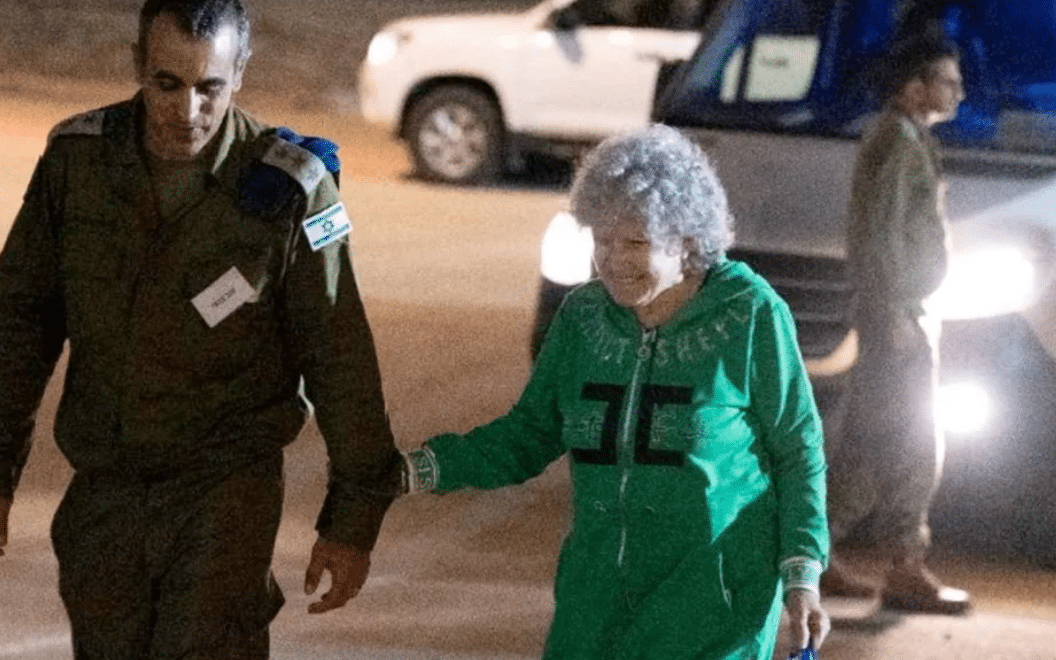Kept in the dark. Forced to sit in silence. Fed only meager rations. These and even more chilling scraps of information are beginning to show how hostages survived in Hamas captivity.
Around 240 people, from infants to octogenarians, were taken hostage during Hamas’ attack on Israel on October 7. Dozens have been freed but many more remain missing, presumed to be held by the Palestinian militant organization and other groups in Gaza, as the warring sides resume battle.
[The CNN Report continues]
Under the terms of the deal between Israel and Hamas, most of those released are women, children and foreign workers. As of Friday, only one adult Israeli man – who also had Russian citizenship – had been released and no members of the Israeli military. Hostages are believed to be spread across locations and in the hands of different groups. It’s already seeming that not all hostages were treated the same way; the story of each new person recovered will add to the understanding.
Kept in the dark amid ‘nonstop bombing’
Adina Moshe was dragged from her safe room at home in Israel, taken to Gaza and forced into tunnels five stories underground, her nephew Eyal Nouri said.
“They took her inside the tunnels … she walked, bare feet in the mud of the tunnels,” he told CNN of the first hours of her captivity. “It was very hard to breathe. They marched [for] hours in the tunnels.”
Moshe said his aunt was held in an underground room where the lights were switched on for only two hours a day. The darkness was literal and also figurative, Nouri said. Deprived of any information, their other senses and imaginations became keener.
“They didn’t know anything about what happened above,” Nouri said. “They just heard the nonstop bombing until the day before their release. Suddenly, there was amazing silence and they knew something was going to happen but they didn’t know what.”
[The CNN Report continues]
“It’s her birthday on the 17th of [November]. She will be 9,” he said. “She won’t even know what day it is. She won’t know it’s her birthday. There will be no birthday cake. No party, no friends. She will just be petrified in a tunnel under Gaza. That is her birthday.”
[The CNN Report continues]
“That’s terrifying. Being pulled, dragged, pushed … under gunfire probably,” Hand said. An estimated 40-50% of buildings in northern Gaza have been damaged, independent researchers say, and the United Nations’ Office for the Coordination of Humanitarian Affairs said on Wednesday up to 1.8 million people in Gaza, or nearly 80% of the population, are thought to be internally displaced.
Hand was right about Emily losing track of time. Released on the 50th day of captivity inside what she called “the box,” the little girl told her father she thought she had been gone for a year.
Forced to endure in silence
“The most shocking, disturbing part of meeting her was she was just whispering, you couldn’t hear her. I had to put my ear on her lips,” Hand said of Emily. “She’d been conditioned not to make any noise.”
Both Emily and Hila dared only to whisper, even once they were back with their families. Three days later, Hand said he could hear Emily from about a meter (three feet) away when she talked, but when she cried she buried herself under bedclothes and was almost silent.
[The CNN Report continues]
Fed survival rations
Captives ate the same food as the guards, according to Lifshitz, who was released with her neighbor on October 24.
Grandmother Ruth Munder told Israel’s Channel 13 conditions got worse as the captivity went on, and as Israel’s vise on Gaza tightened. UN officials have warned of “massive outbreaks of infectious disease and hunger” in the enclave due to Israel’s strict blockade on all imports beyond a small amount of humanitarian aid.
At the beginning, a guard brought chicken, rice, canned goods and cheese for the hostages. “When we got up we had tea and in the evening once again tea and sweet things for the children,” Munder said, “until the economic situation started to be bad and people were hungry.”
Adina Moshe said in her tunnel room, “They were fed only rice, some beans from cans, which they tried to avoid eating so as not to have stomachache,” her nephew reported.
[The CNN Report continues]
Thai former captive Uthai Saengnuan said his concern was with his countrymen still in captivity.
Physical and mental wounds
Eitan, the 12-year-old, was beaten when he arrived in Gaza, his aunt also said. “Perhaps I was naïve but I thought he would be well-treated. But no, they are monsters,” she said of his Hamas captors.
Emily Hand said she was not hit and her father said he believed harsh voices were enough to make her do what was wanted.
When her friend Hila talks of her captivity, it’s like she’s describing a scene from a movie she watched, not something she went through herself, her uncle Yair Rotem told CNN.
“She’s a little bit distant now, she’s a little bit cold,” he said. “She talks about things that happened like it’s in third person, like it happened to someone else. She’ll say she saw horrible things, but she says it with a straight face.”
The father of a Thai hostage who spoke to his son after he was freed said he sounded in good health and good spirits. “He suffered from bugs biting him while in captivity,” Chumpron Jirachart, father of Manee Jirachart, told CNN.
[The CNN Report continues]
“You can see on her body that she was dragged from place to place, that she was handcuffed,” he said. “She has chemical wounds from not treating her basic needs.”
First steps to recovery
Rehabilitation will take time. Former detainees may experience a range of layered psychological impacts including anxiety, depression, disorientation, grief, post-traumatic stress and survivor’s guilt, experts say.
Many hostages lost their homes in the October 7 attacks; as they return, some are also finding out how many of their friends and relatives were killed.
[The CNN Report continues]
But their patients were strong and determined.
“Over the last five days, we met children who were initially withdrawn and lost, and after a day or two, they were already running around the ward, playing and laughing.”
Israel said Friday it believed 137 hostages taken captive on October 7 remained in Gaza.

